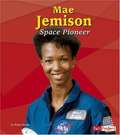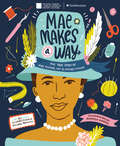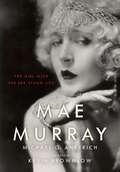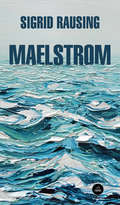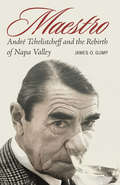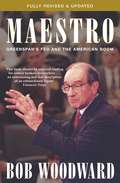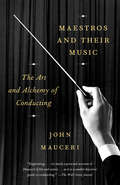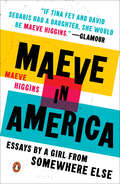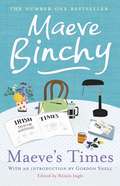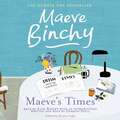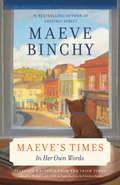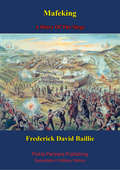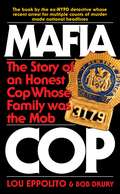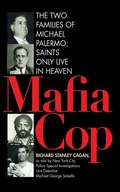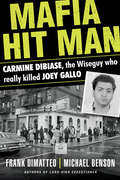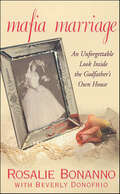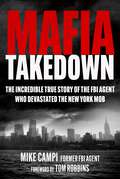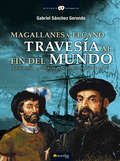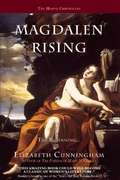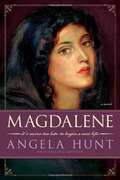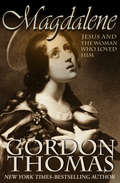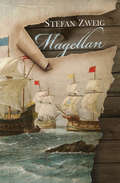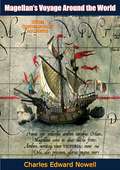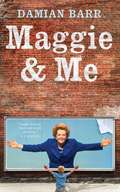- Table View
- List View
Mae Jemison: Space Pioneer (Fact Finders Biographies: Great African Americans)
by Robert Kraske James GerardProvides an introduction to the life and biography of Mae Jemison, the first African-American woman to travel into space in 1992 on the space shuttle Endeavour.
Mae Makes a Way: The True Story of Mae Reeves, Hat & History Maker
by Olugbemisola Rhuday-PerkovichTip your hat to fashion designer and civil rights icon Mae Reeves in this picture book biography written in collaboration with the Smithsonian National Museum of African American History and Culture!"A fine introduction to a determined trailblazer." -The New York Times Mae had a dream to make one-of-a-kind hats. But the path for a Black female designer was unclear, so Mae made a way, leaving her home in the segregated South to study at the Chicago School of Millinery. Mae had the skills, but craved the independence to create her own styles. So Mae found a way. In Philadelphia, she became the first Black woman to own a business on South Street. Whether you were Lena Horne, Ella Fitzgerald, Marian Anderson or a lady from the neighborhood, Mae wanted you to look good and feel special in one of her original hats. A mother, a successful entrepreneur, and a community advocate, Mae led the way. Published in collaboration with the Smithsonian National Museum of African American History and Culture, acclaimed author Olugbemisola Rhuday-Perkovich (Two Naomis) and award-winning illustrator Andrea Pippins (I Love My Hair) bring the life of fashion entrepreneur and civic organizer Mae Reeves to the page. And when you are done reading, explore Mae&’s store and styles in person at her permanent exhibit at the National Museum of African American History and Culture.
Mae Murray: The Girl with the Bee-Stung Lips (Screen Classics)
by Michael G. AnkerichThis story of a silent-film star&’s rise and fall offers &“a lesson about those heady days of early Hollywood and the transience of fame&” (Library Journal). Renowned for her classic beauty and charismatic presence, Mae Murray rocketed to stardom as a dancer in the Ziegfeld Follies, moving across the country to star in her first film, To Have and to Hold, in 1916. An instant hit with audiences, Murray soon became one of the most famous names in Tinseltown. But Murray&’s moment in the spotlight was fleeting. The introduction of talkies, a string of failed marriages, a serious career blunder, and a number of bitter legal battles left the former star in a state of poverty and mental instability that she would never overcome. In this intriguing biography, Michael G. Ankerich traces Murray&’s career from the footlights of Broadway to the klieg lights of Hollywood, recounting her impressive body of work on the stage and screen and charting her rapid ascent to fame and decline into obscurity. Featuring exclusive interviews with Murray&’s only son, Daniel, and with actor George Hamilton, whom the actress closely befriended at the end of her life, Ankerich restores this important figure in early film to the limelight. &“If Billy Wilder hasn&’t made the definitive movie about the delusions of stardom in Sunset Boulevard, Murray&’s story, a blend of absurdity and pathos, would make a terrific one.&” —TheWashington Post Includes photos
Maelstrom
by Sigrid RausingLas memorias de la editora Sigrid Rausing sobre el impacto de la adicción a las drogas en una familia. ¿A qué se parece la tragedia cuando se entrelaza con el privilegio? Durante años, la editora Sigrid Rausing observó impotente cómo su hermano, Hans, y la esposa de este, Eva, sucumbían a las drogas hasta que un día Eva apareció muerta en su mansión de Londres. Los Rausing son los nietos del fundador de la empresa sueca Tetra Pak y herederos, por tanto, de una enorme fortuna. La prensa amarilla devoró esta historia de multimillonarios, muerte, adicción, juicios y conflictos familiares, pero pocos entendieron el sufrimiento de los que conocían a la joven pareja. Estas memorias son el intento de Sigrid Rausing para comprender qué les pasó a su hermano y a su mujer. La autora resigue su tragedia familiar y con una sabiduría humilde se hace preguntas dolorosas y elocuentes sobre la adicción, pero también sobre el trasfondo de lacondición humana. ¿Cómo se vive con una adicción en la familia? ¿Cómo ayudar cuando hacerlo implica imponer un estado policial, eliminar la libertad del adicto? ¿Qué implica sobrevivir a la adicción de tu pareja? ¿Cómo controlamos o cómo nos rendimos ante nuestros destinos soñados? Reseñas:«Unas memorias intensas, líricas y lúcidas que plantean cuestiones dolorosas sobre la culpa, la inocencia y el juicio. Maelstrom nos recuerda lo difícil que puede llegar a ser distinguir uno del otro.»Siri Hustvedt «Ahora que todo ha pasado, me sorprendo pensando en la historia y los recuerdos familiares; en los relatos que cohesionan a las familias y los actos capaces de desintegrarlas.»Sigrid Rausing «Una historia única e inolvidable.»The Times «Sorprendente: poderoso y discreto.»The Observer «Rausing retrata la escena con una delicadeza pictórica, para después dar un paso atrás y analizar las implicaciones de lo que ha revelado.»The Guardian «Fascinante, perspicaz, excepcionalmente articulada. Rausing es una experta antropóloga.»The Telegraph «Un libro valiente, iluminado por la notable franqueza de la autora.»The New Statesman «Cautivadora. Maelstrom es profundamente apasionada en su imposible intento de invocar una vitalidad salvadora en medio de un caos agonizante. Un libro valiente, elegante e inspirado.»Andrew Solomon
Maestro: André Tchelistcheff and the Rebirth of Napa Valley (At Table)
by James O. GumpWine insiders called André Tchelistcheff the &“winemaker&’s winemaker,&” the &“wine doctor,&” and simply &“maestro.&” After Prohibition brought Napa Valley and its wine industry to the brink of catastrophe, Tchelistcheff (1901–94) proved essential in its revitalization. Tchelistcheff&’s unique background—a sickly child, a Russian émigré forced from his homeland during the Bolshevik Revolution, a White Army lieutenant who fought in the Crimea, a physical laborer in a Bulgarian coal mine, a Czechoslovakian-trained agronomist, and a French-schooled viticulturist and enologist—prepared him for a remarkable winemaking career. He spent thirty-five years in Napa Valley&’s Beaulieu Vineyard and nearly two &“post-retirement&” decades doing freelance consulting work for more than thirty wineries. His early struggles forged his principal character traits, which he passed on to an entire generation of winemakers. His students, including some of the most accomplished winemakers of the post-Prohibition period, marveled over their mentor&’s sense of authority, profound insight, humble presence, and abundant wisdom. This inspiring account of Tchelistcheff&’s life includes interviews with friends, family, and mentees, which reveal how one man used his passion and knowledge to help save a community on the edge of disaster. In Maestro James O. Gump preserves the memory of a fascinating individual and one of the most influential winemakers of the modern era.
Maestro: Greenspan's Fed and the American Boom
by Bob WoodwardIn eight Tuesdays each year, Federal Reserve chairman Alan Greenspan convenes a small committee to set the short-term interest rate that can move through the American and world economies like an electric jolt. As much as any, the committee's actions determine the economic well-being of every American. The availability of money for business or consumer loans, mortgages, job creation and overall national economic growth flows from those decisions. Perhaps the last Washington secret is how the Federal Reserve and its enigmatic chairman, Alan Greenspan, operate. In Maestro, Bob Woodward takes you inside the Fed and Greenspan's thinking. We listen to the Fed's internal debates as the American economy is pushed into a historic 10-year expansion while the world economy lurches from financial crisis to financial crisis. Greenspan plays a sometimes subtle, sometimes blunt behind-the-scenes role. He appears in Maestro up close as never before -- alternately nervous and calm, plunging into mathematics one moment and politics the next, skeptical, dispassionate, always struggling -- often alone. Maestro traces a fascinating intellectual journey as Greenspan, an old-school anti-inflation hawk of the traditional economy, is among the first to realize the potential in the modern, high-productivity new economy -- the foundation of the current American boom. Woodward's account of the Greenspan years is a remarkable portrait of a man who has become the symbol of American economic preeminence.
Maestros and Their Music: The Art And Alchemy Of Conducting
by John MauceriAn exuberant, uniquely accessible, beautifully illustrated look inside the enigmatic art and craft of conducting, from a celebrated conductor whose international career has spanned half a century. John Mauceri brings a lifetime of experience to bear in an unprecedented, hugely informative, consistently entertaining exploration of his profession, rich with anecdotes from decades of working alongside the greatest names of the music world. With candor and humor, Mauceri makes clear that conducting is itself a composition: of legacy and tradition, techniques handed down from master to apprentice--and more than a trace of ineffable magic. He reveals how conductors approach a piece of music (a calculated combination of personal interpretation, imagination, and insight into the composer's intent); what it takes to communicate solely through gesture, with sometimes hundreds of performers at once; and the occasionally glamorous, often challenging life of the itinerant maestro. Mauceri, who worked closely with Leonard Bernstein for eighteen years, studied with Leopold Stokowski, and was on the faculty of Yale University for fifteen years, is the perfect guide to the allure and theater, passion and drudgery, rivalries and relationships of the conducting life.
Maeve in America: Essays by a Girl from Somewhere Else
by Maeve Higgins“If Tina Fey and David Sedaris had a daughter, she would be Maeve Higgins.” —Glamour“Maeve Higgins is hilarious, poignant, conversational, and my favorite Irish import since U2. You’re in for a treat.” —Phoebe RobinsonA timely essay collection about life, love, and becoming an American from breakout comedy star and podcaster Maeve Higgins Maeve Higgins was a bestselling memoirist and comedian in her native Ireland when, at the grand old age of thirty-one, she left the only home she’d ever known in search of something more. Like many women in their early thirties, she both was and was not the adult she wanted to be. At once smart, curious, and humane, Maeve in America is the story of how Maeve found herself, literally and figuratively, in New York City. Here are stories of not being able to afford a dress for the ball, of learning to live with yourself while you’re still figuring out how to love yourself, of the true significance of realizing what sort of shelter dog you would be. Self-aware and laugh-out-loud funny, this collection is also a fearless exploration of the awkward questions in life, such as: Is clapping too loudly at a gig a good enough reason to break up with somebody? Is it ever really possible to leave home? Together, the essays in Maeve in America create a startlingly funny and revealing portrait of a woman who aims for the stars but hits the ceiling, and the inimitable city that has helped shape who she is, even as she finds the words to make sense of it all.
Maeve's Times
by Maeve Binchy'Maeve's Times is funny and clever and kind, which are excellent qualities in both books and people' Irish Times'As someone who fell off a chair not long ago trying to hear what they were saying at the next table in a restaurant, I suppose I am obsessively interested in what some might consider the trivia of other people's lives.'Maeve Binchy is well known for her bestselling novels, but for many years Maeve was a journalist. From 'The Student Train' to 'Plane Bores' and 'Bathroom Joggers' to 'When Beckett met Binchy', these articles have all the warmth, wit and humanity of her fiction. Arranged in decades, from the 1960s to the 2000s, and including Maeve's first and last ever piece of writing for the Irish Times, the columns also give a fascinating insight into the author herself.With an introduction written by her husband, the writer Gordon Snell, this collection of timeless writing reminds us of why the leading Irish writer was so universally loved.
Maeve's Times
by Maeve BinchyAs someone who fell off a chair not long ago trying to hear what they were saying at the next table in a restaurant, I suppose I am obsessively interested in what some might consider the trivia of other people's lives.'Maeve Binchy is well-known for her bestselling novels, the most recent of which was A WEEK IN WINTER. But for many years Maeve was a journalist, writing for the IRISH TIMES. From 'The Student Train' to 'Plane Bores' and 'Bathroom Joggers' to 'When Beckett met Binchy', these articles have all the warmth, wit and humanity of her fiction. Arranged in decades, from the 1960s to the 2000s, and including Maeve's first and last ever piece of writing for the IRISH TIMES, the columns also give a fascinating insight into the author herself.With an introduction written by her husband, the writer Gordon Snell, this collection of timeless writing reminds us of why the leading Irish writer was so universally loved.Read by Kate Binchy(p) 2013 Orion Publishing Group
Maeve's Times: In Her Own Words
by Maeve BinchyFive decades of selected writings from the Irish Times by the beloved and best-selling author, filled with her hallmark humor, candor, and wisdom-a timeless gift to her legion of fans.Maeve Binchy once confessed: "As someone who fell off a chair not long ago trying to hear what they were saying at the next table in a restaurant, I suppose I am obsessively interested in what some might consider the trivia of other people's lives." She was an accidental journalist, yet from the beginning, her writings reflected the warmth, wit, and keen human interest that readers would come to love in her fiction. From the royal wedding to boring airplane companions, Samuel Beckett to Margaret Thatcher, "senior moments" to life as a waitress, Maeve's Times gives us wonderful insight into a changing Ireland as it celebrates the work of one of our best-loved writers in all its diversity-revealing her characteristic directness, laugh-out-loud humor, and unswerving gaze into the true heart of a matter.
Mafeking: A Diary Of The Siege [Illustrated Edition]
by Frederick David BaillieThe siege of Mafeking still stands as one of the British Military's high achievements, especially during the depths of the badly handled Boer War. The successful defence and relief were a shot in the arm for the British public which had become all too used to defeats and reverses in South Africa. Leading the heroic defence of Mafeking was the Colonel Baden-Powell, whose ingenious new methods of keeping the defence going - such as an armoured train, a salvaged cannon, fake barbed wire - were to become part of his legend.Enduring the siege with Baden-Powell was the correspondent for the Morning Chronicle, F.D Baillie, a late major in the 4th Queen's Own Hussars; who wrote a day-by-day account of the siege from behind the defences.This edition benefits from numerous illustrations from the newspaper clippings of the time.
Mafia Cop: The Story of an Honest Cop Whose Family Was the Mob
by Lou Eppolito Bob DruryHis father, Ralph "Fat the Gangster" Eppolito, was stone-cold Mafia hit-man. Lou Eppolito, however, chose to live by different code; he chose the uniform of NYPD. And he was one of the best -- a good, tough, honest cop down the line. But even his sterling record, his headline-making heroism, couldn't protect him when the police brass decided to take him down. Although completely exonerated of charges that he had passed secrets to the mob, Lou didn't stand a chance. They had taken something from him they couldn't give back: his dignity and his pride. Now, here's the powerful story, told in Lou Eppolito's own words, of the bloody Mafia hit that claimed his uncle and cousin... of his middle-of-the-night meeting with "Boss of Bosses" Paul Castellano... of one good cop who survived eight shootouts and saved hundreds of victims, who was persecuted, prosecuted, and ultimately betrayed by his own department. Full of hard drama and gritty truth, Mafia Cop gives a vivid, inside look at life in the Family, on the force, and on the mean streets of New York.
Mafia Cop: The Two Families of Michael Palermo; Saints Only Live in Heaven
by Richard CaganDetective Michael Palermo built his career on his unique ability to inhabit two worlds at once: the world of law enforcement and the underworld of New York’s crime family organizations. Palermo participated in over two thousand arrests while maintaining close relationships with the kingpins of organized crime—ties that allowed him to stay one step ahead of the rest of the New York City Police Department. This true crime drama takes you inside the police force at its most corrupt and into the dark and dirty world of dons, consiglieres, underbosses, button men, soldiers, and cowboys.
Mafia Hit Man: Carmine DiBiase, The Wiseguy Who Really Killed Joey Gallo
by Michael Benson Frank DiMatteo Sr.WHO REALLY KILLED &“CRAZY JOE&” GALLO? AT LAST, THE TRUTH CAN BE TOLD. AND IT WASN&’T FRANK &“THE IRISHMAN&” SHEERAN AS HE CLAIMED. This is the shocking and brutal story of Carmine DiBiase—aka Sonny Pinto—the elusive Mafia killer who went from small-time street punk to FBI&’s Most Wanted list to Death Row—only to be released on the streets to kill and kill again . . . among those who died by his gun was Joey Gallo. &“Sober, he was nothing, but drunk he would blow your head off.&” That&’s how Pete the Greek described Carmine &“Sonny&” DiBiase, the Colombo crime family hitman who&’d been terrorizing Manhattan&’s Little Italy since he was a kid. After beating and robbing a local tailor and doing time in reformatory, Sonny set up operations at The Mayfair Boys Civic and Social Club, an illegal poolroom where he shot and killed his best friend on Christmas day . . . A prime suspect of this and other crimes, Sonny went on the lam and off the grid for seven years. He then surrendered himself to police, was tried for murder and sentenced to death. But after a second trial, he walked away a free man—free to kill again. Joey &“Crazy Joe&” Gallo and his President Street mob waged a deadly Mafia civil war with the Colombo crime family, and in particular, Carmine &“the Snake&” Persico. A contract was put out for Gallo and his gang. And on that fateful night of April 7, 1972, in a Little Italy restaurant, Gallo was assassinated . . . by Carmine &“Sonny&” DiBiasi.. This is the true story of who really whacked Crazy Joey Gallo on that fateful night of April 7, 1972.
Mafia Marriage: An Unforgettable Look Inside the Godfather's Own House
by Beverly Donofrio Rosalie BonannoAn Unforgettable Look Inside the Godfather's Own House that Inspired the CBS Miniseries Love, Honor and ObeyShe Was A Profaci. He Was A Bonanno.Rosalie Profaci was a Mafia princess. Salvatore "Bill" Bonanno, oldest son of Mafia Don Joe Bonanno, the real-life model for The Godfather, was organized crime's crown prince. And Bill, deeply involved in his father's "business" of mob schemes thought pretty Rosalie knew what it meant to be a "Mafia wife." But the convent-raised, deeply devout Rosalie, whose innocence was protected by her doting father, had no idea... Their Marriage United Two Mafia Dynasties...Mafia Marriage is Rosalie Bonanno's intimate account of life inside the secretive world of the Mafia. Naming names and providing shocking details, she writes about the wild spending sprees, the mysterious absences of her husband, the other women in his life, the running from the law, the abductions, and shootings. Above all, Rosalie reveals the passion that kept her virtually a prisoner to love...and her heartbreaking journey of discovering the truth and trying to break free.
Mafia Marriage: My Story
by Beverly Donofrio Rosalie BonannoA Look Inside the Godfather's Own House. Rosalie Profaci was a Mafia princess. Salvatore Bill Bonanno, oldest son of Mafia Don Joe Bonanno, the real-life model for The Godfather, was organized crime's crown prince.
Mafia Takedown: The Incredible True Story of the FBI Agent Who Devastated the New York Mob
by Mike CampiThe true story of FBI agent Mike Campi who led some of the most relentless and successful attacks on organized crime in American history. A unique and unexpected set of circumstances caused former FBI agent Mike Campi to finally step forward and reveal himself. The result is this tour de force, which details his years operating deeply in the trenches to devastate the mafia. You will learn how he took down a staggering array of mob bosses, underbosses, consiglieri, capos, soldiers, and other legends from all five New York crime families. He takes you inside his investigative, critical, make-or-break moments, which he navigated to achieve astonishing success. Along the way, he provides you with insight into the external and internal forces often working to undermine him. And he lifts the curtain to reveal the untold treachery and hypocrisy underlying the real American mafia, as illustrated by the words of one crime boss who was recorded by Mike describing his underlings: &“They&’re suckers—we just use them.&” Mafia Takedown, to be released on the anniversary of the infamous November 14, 1957, Apalachin meeting of top mafia leaders from the US and Italy, is chock-filled with an array of stunning facts and truths. A sample includes: the Catholic priest who fled America to save his life from the mob; mafia members recorded describing in their own words their innermost secrets; how Mike and federal prosecutors obtained the boss of all bosses Vincent &“the Chin&” Gigante&’s courthouse confession that his legendary crazy act was a fraud all along; what the Chin said when America was attacked on September 11, 2001; and the explosive, dark secret that almost undermined one of the most important undercover operations in the history of law enforcement. You&’ll learn so much more: such as how and why the most important undercover mafioso in history wanted to work with Mike, and only with Mike; and how the Chin was only months away from escaping justice entirely. For fans of organized crime, of true crime, or simply of engaging and enjoyable stories—this book is an absolute must read.
Magallanes y Elcano: travesía al fin del mundo (Historia Incógnita)
by Gabriel Sánchez SorondoDescubra la fascinante historia de los protagonistas de la trágica travesía de 14.500 leguas qué rompió el monopolio portugués del comercio de especias y logró circunnavegar la Tierra por primera vez tras 3 años de atribulada navegación.
Magdalen Rising: The Beginning (The Maeve Chronicles #1)
by Elizabeth CunninghamYoung Magdalen and Jesus, brimming with youthful charm and arrogance, find each other and fall in love, forging a bond that is stronger than death. Their pleasure is overshadowed by a brilliant but unbalanced druid who knows a perilous secret about Maeve's past. The prequel to The Passion of Mary Magdalen.
Magdalene
by Angela Elwell HuntThe controversial woman with a past only one Man could forgive. A true love story.
Magdalene: Jesus and the Woman Who Loved Him
by Gordon ThomasA vivid portrait Mary Magdalene, one of the Bible&’s most compelling women, from the New York Times–bestselling author of Pontiff. Both sinner and saint, passionate and devoted, the figure of Mary Magdalene has fired imaginations throughout the ages. As arguably the closest of Jesus&’s followers, Mary Magdalene offered a unique perspective on the most enigmatic of men. Drawing on detailed research and informed speculation, this is a vivid and compelling account of Mary&’s life and the Jesus she knew, by the bestselling author of Trial.
Magellan
by Eden Paul Cedar Paul Stefan ZweigThe Portuguese explorer Ferdinand Magellan (1480-1521) is one of the most famous navigators in history - he was the first man to sail from the Atlantic to the Pacific Ocean, and led the first voyage to circumnavigate the globe, although he was killed en route in a battle in the Philippines.In this biography, Zweig brings to life the Age of Discovery by telling the tale of one of the era's most daring adventurers. In typically flowing and elegant prose he takes us on a fascinating journey of discovery ourselves.
Magellan’s Voyage Around the World: Three Contemporary Accounts
by Charles Edward Nowell“…a fundamental work for anyone who desires both the English version of the story of this path-breaking voyage and an up-to-date evaluation of the scholarly production about the voyage that has appeared during the last four and a half centuries.”—Lewis Hanke, Columbia UniversityToday when men orbit the globe in a few minutes, it is difficult to imagine the awe that accompanied the news of the three years’ voyage completing man’s first circumnavigation of the earth. Wonder and amazement marked the contemporary accounts of Magellan’s hazardous adventure; and now the three best accounts have been gathered into one volume and provided with an introduction and commentary based on the most accurate historical information available by an eminent scholar of Hispanic studies.Included are translations of the accounts by Antonio Pigafetta, one of the eighteen actual survivors of the 241 who undertook the voyage; by the secretary of Emperor Charles V, Maximilian of Transylvania, who wrote a long report based on first-hand accounts to his father, the Cardinal of Salzburg; and by Gaspar Correa, a Portuguese historian, who twenty years later wrote of the voyage mixing fact with fanciful tales of the Far East.Several of the maps prepared for this edition are in the style of the period and represent conceptions of the world as seen by cartographers and navigators at the beginning of the Age of Discovery.
Maggie & Me: A Memoir
by Damian BarrLong-listed for the Green Carnation Prize and The Sunday Times' selection for Memoir of the Year. "This amazing book tells the story of an appalling childhood with truth and clarity unsmudged by self-pity. It grips from beginning to end.” — Diana Athill, Costa Book Award–winning author of Somewhere Towards the End Frank McCourt’s Angela’s Ashes crossed with Billy Elliot, Maggie & Me is a unique, tender, and witty memoir of surviving the tough streets of small town Scotland during the Thatcher years. October 12, 1984. An IRA bomb blows apart the Grand Hotel in Brighton. Miraculously, Maggie Thatcher survives. In small-town Scotland, eight-year-old Damian Barr watches in horror as his mum rips her wedding ring off and packs their bags. He knows he, too, must survive. Damian, his sister, and his Catholic mum move in with her sinister new boyfriend while his Protestant dad shacks up with the glamorous Mary the Canary. Divided by sectarian suspicion, the community is held together by the sprawling Ravenscraig Steelworks. But darkness threatens as Maggie takes hold: she snatches school milk, smashes the unions, and makes greed good. Following Maggie’s advice, Damian works hard and plans his escape. He discovers that stories can save your life and — in spite of violence, strikes, AIDS, and Clause 28 — manages to fall in love dancing to Madonna in Glasgow’s only gay club. Maggie & Me is a touching and darkly witty memoir about surviving Thatcher’s Britain; a story of growing up gay in a straight world and coming out the other side in spite of, and maybe because of, the iron lady.
